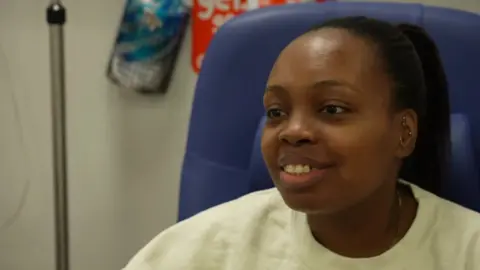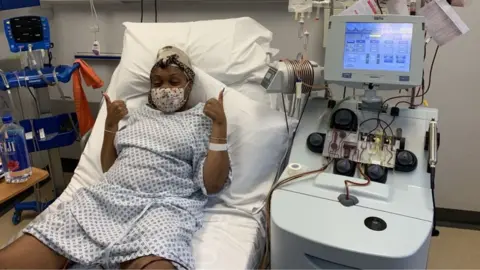Sickle cell patient gets world-first NHS test
 BBC
BBCA patient with sickle cell disorder says she is optimistic for the future after a new genetic test was launched.
Stephanie George, 32, from London, was one of the first patients to receive a "blood matching" genetic test at Whittington Hospital in north London.
The genotyping test aims to better match patients' blood transfusions and reduce the risk of side effects.
On Monday, the NHS became the first healthcare system in the world to provide the blood group test.
It means almost 18,000 patients living with sickle cell disorder and thalassaemia in England are now eligible for more accurate blood matching.
Ms George said: "Sickle cell affects my life every day.
"We're not lazy, we have a blood condition and yes it is debilitating but we still want to live as normal a life as we possibly can."
 Stephanie George
Stephanie George'Patients need it'
She has been having blood transfusions for more than 20 years, and receives them around every six weeks.
"I do think the new test will be really great," she said. "This illness has been around for such a long time and I'm glad the technology is starting to catch up, because patients need it."
Blood transfusions are commonly used to treat rare inherited blood disorders, but about a fifth of patients develop antibodies against certain blood groups afterwards, NHS England said.
To help improve blood-matching and reduce the risk of antibodies developing, the NHS is encouraging patients with sickle cell, thalassaemia and transfusion-dependent rare inherited anaemias to have this test taken alongside their routine hospital blood tests.
Ryan Mullally, consultant haematologist at Whittington Health NHS Trust in Archway, said: "We can learn more and develop better blood matching further by using this exciting new world-leading test.
"We are keen to raise awareness of it among patients and specialist medical and nursing teams involved in their care."
'Step forward'
Health minister Andrea Leadsom called the test a "huge step forward".
There are about 17,000 people living with sickle cell disorder in England, with some 250 new cases diagnosed each year.
It is more common in people of Black African and Caribbean heritage.
Thalassaemia is mainly seen in those with an Asian, Middle Eastern and southern Mediterranean heritage, with about 800 patients in England and fewer than 50 new cases each year, NHS England said.
Sara Trompeter, NHS Blood and Transplant consultant haematologist, said: "The initiative will rely on patients attending hospital and having their blood sent to NHS Blood and Transplant for testing.
"We strongly encourage clinical and laboratory teams to work with patients to support this programme."

Listen to the best of BBC Radio London on Sounds and follow BBC London on Facebook, X and Instagram. Send your story ideas to [email protected]
